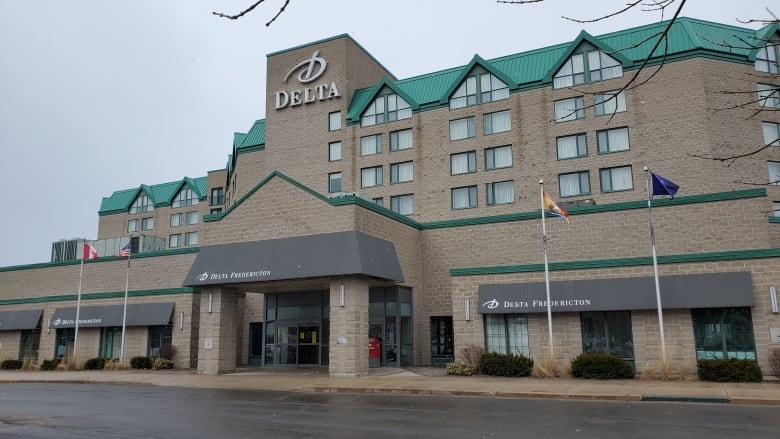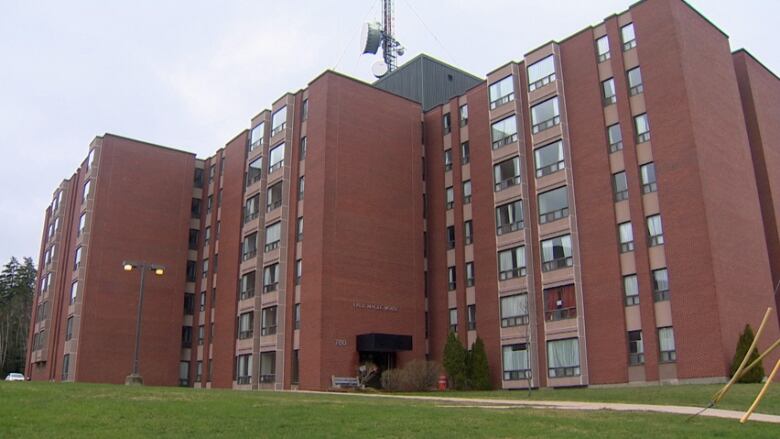Delta Fredericton 'outbreak' fuelled by B1617 variant, may be spreading by surface contact
'Strong probability' transmission is via fomites, such as doorknobs and phones, says internal Horizon memo

A growing "cluster" of COVID-19 cases at the Delta Fredericton is fuelled by the variant first reported in India and health officials believe there's a "very strong probability" it's spreading through surface contacts rather than respiratory droplets or aerosols, according to an internal Horizon Health Network memo.
There are now 36 cases linked to the former isolation hotel for non-essential travellers10 "direct" cases and 26 contacts in the community and "contacts of contacts," the Department of Health confirmed Wednesday. At least one of them involves an employee.
Public Health has referred to the situation as a "cluster," not an outbreak.
But Horizon's COVID-19 committee on infectious disease and infection, preventionandcontrol, which is co-chaired by Dr. Gordon Dow, a member of the provincial pandemic task force,described it as an outbreak in a bulletin to staff Monday.
"Public Health experience during the recent COVID-19 B.1.617 (Indian variant of concern) outbreaks at UNB Magee House residence and the Delta Hotel in Fredericton, has highlighted a very strong probability of contact/fomite transmission,"the bulletin, obtained by CBC News, states.
Fomites are inanimate objects, such as doorknobs, handrails, countertops, telephones and keyboards, that may become contaminated either through respiratory droplets being expelled by infected individuals, or through cross-contamination from hands.
The infection spreadswhen peopletouch these objects or surfacesand then inadvertently touch theirmouth, nose, or eyes, explains the bulletintitled "Variants of Concern Fomite Transmission."
According to the Public Health Agency of Canada, COVID-19 spreads from an infected person to others through respiratory droplets and aerosols, which are smaller droplets, created when an infected person talks,sings,shouts,coughs orsneezes.
COVID-19 can also spread by touching something that has the virus on it, then touching your mouth, nose or eyes with unwashed hands, the agency's website states.
"It is still unclear how easily the virus spreads through contact with surfaces or objects."
Elevator eyed at UNB's Magee House
In the UNBMagee House outbreak,Public Health believes the elevator in the seven-storey apartment-style residence was the source of transmission.
"Ourfinal conclusion, based on the fact that we did not find anything else,that is ourbest hypothesis and conclusion at this point in time," Chief Medical Officer of Health Dr. Jennifer Russell said last week.
Officials initially looked into whether the ventilation system was behind the outbreak, which wasdeclared on April 27, resulted in at least 13 confirmed cases and forced some people to remain in isolation until last Sunday. Butthey deemed the risk from the recirculated air "minimal."

A Public Health inspector and UNB engineers found "there was ateeny tiny chance that there could have been some cross-contaminationwith one particular component" ofthe ventilation system, Russell told reporters during the May 12 COVID briefing.
"So that was shut off [April 27], and they won't be turning it back on until we give the go-ahead," she said.
Neither Public Health nor UNB has provided a public update on the status of the ventilation system since then.
The Horizon bulletin indicates hand hygiene and environmental cleaning and disinfection are the most effective means to prevent contact/fomite transmission.
Hands must be cleaned "at minimum":
- Before contact with patients or patient area
- After contact with patients or patient area
- Before aseptic procedures
- After contact with body fluids
- Following contact with a shared item or surface, such as a keyboard, computer mouse, phone, dictaphoneand handrails.
Increased environmental cleaning and disinfection of shared items and surfaces is also "a key step in reducing the risk of transmission of infection."
"As health care workers we all play a role in preventing the transmission of infection."
Although Public Health has said the Delta situation isnotan outbreak, it has required processes at the hotel similar to those the Provincial Rapid Outbreak Management Team, known as PROMT,would use in a long-term care homeoutbreak to help withrisk management and testing.
PROMT members may include staff from the extramural and ambulance services, government departments, the regional health authorities and volunteers from regulated health professions.
Public Health is hopefulit can contain the Delta cluster, "but many public exposures in multiple settings make this very challenging,"Russell has said.
Health Minister Dorothy Shephard said last Friday that she didn't have any information about whether an employee, isolating guest or regular guest has been identified as the index case.
With files from Karissa Donkin












_(720p).jpg)


 OFFICIAL HD MUSIC VIDEO.jpg)
.jpg)



























































































